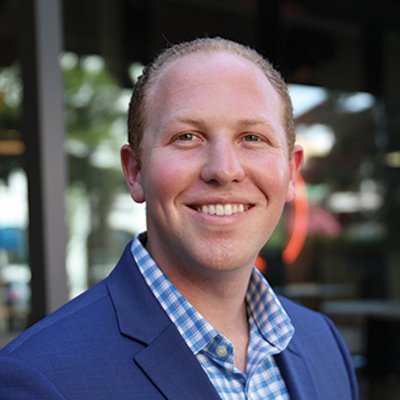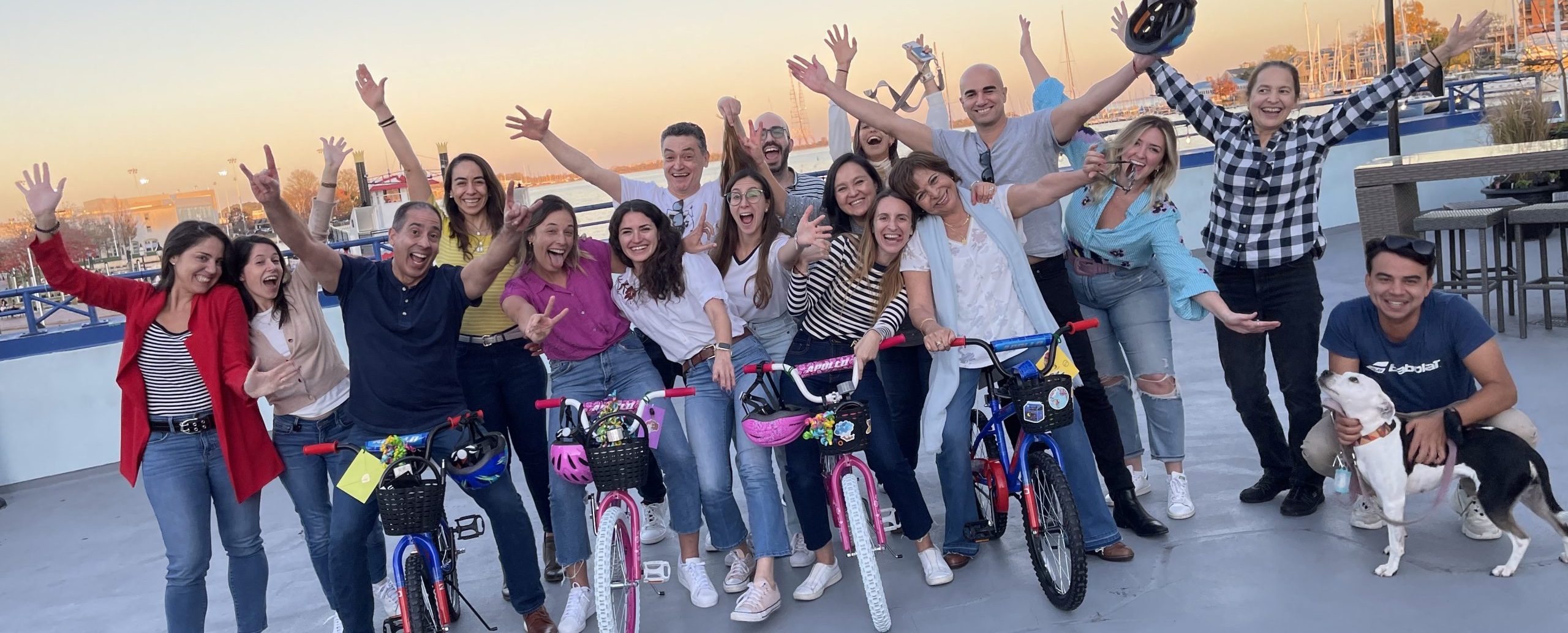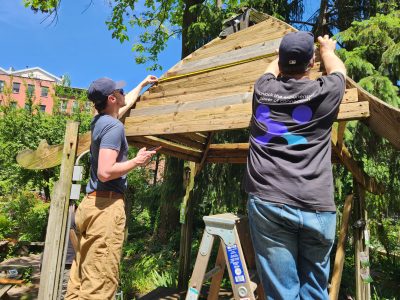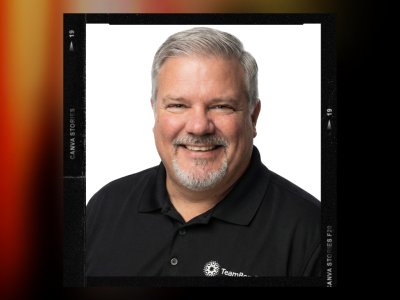STRONG TEAMS DON’T HAPPEN BY CHANCE 
Escape the Office: The Power of Corporate Offsites
w/Jared Kleinert

Use the buttons above to listen now.
Transcript - Escape the Office: The Power of Corporate Offsites
Rich: On this episode of Team Building Saves the World.
Jared: Offsites are really a, a core pillar of how you build company culture that could lead to company benefit, but also personal benefit, sort of just building new friendships and work and combating the loneliness that comes with remote work.
Potentially they get to. You know, be in castles and race supercars and be on yachts, and how we actually build that. That’s not my job.
Rich: Hello team. It’s me, your old friend, rich Rininsland host of team buildings saves the world, the show where I speak to thought leaders from around the world discussing variable strategies and tools to help you and your team build a better work environment. And today I need a vacation. So we’re talking about corporate retreats with an award-winning author, Ted speaker, and ceo.
Co-founder of offsite Jared Kleinert. But first, I need to share some love with my supporters out there at Team Bonding. If your team is ready to experience teamwork through the Power of Play, to visit team bonding.com to learn more. Now, team, join me in welcoming my guest, a former delegate to President Obama’s 2013 Global Entrepreneurship Summit in Malaysia, and author of multiple books including
2 billion under 20, how millennials are breaking down barriers and changing the world, and networking. How to meet influential people, deepen relationships, and become a super connector, usa today’s most connected millennial, Jared Kleinert. Jared,
welcome. Well, uh, clearly just from the intro, we can tell you’re an incredibly lazy individual. How are you?
Jared: Yeah. .
Rich: Let’s just start off, Jared, in, even in the intro, that’s just a small portion of the bio that I was able to find for you online. Why don’t you start off, tell my team out there a little bit more about yourself, like how you got involved in this side of, uh, networking and the business.
Jared: Yeah. Well, thanks for having me. Uh, I, I feel really hyped now that you’ve given me that intro. I feel like listening to this podcast is just double espresso in the morning or, or in the evening. Gotta be careful when you listen to this. Sure. Uh, . But, uh, yeah, I’ve, I’ve been an entrepreneur my entire life. Uh, co come from a family of entrepreneurs.
Uh, my first job was, uh, working in catering for my grandmother’s, uh, catering business. So my, my dad worked, still works with his mom to this day, uh, on that business. Started my first company at 15. We don’t have to talk about that. It didn’t really go anywhere.
Rich: That’s okay.
Jared: Uh, my career, I guess, really started when I was 16.
I cold emailed, uh, a person I read about in Forbes called The Most Connected Man You Don’t Know in Silicon Valley. And, and that put me on a path to wanting to learn about networking and relationship building and also gave me the opportunity to work at a VC back startup as one of their first 10 employees called 15 five, uh, today, 15 5 is
one of the top employee engagement and performance management platforms, maybe 250 employees, you know, almost a billion dollar valuation. But I got the opportunity to work under the co-founders there, you know, in my teenage years. And so that catalyzed everything else, uh, you know, took interest in studying other young entrepreneurs and, and wrote about them in my, uh, first two books, uh, and then really got the bug.
Venture backed startups, and it took me 10 years to, to get to the point where I could run a Venture Backable startup in offsite. But yeah. Uh, here we are.
Rich: So can we just clarify how old are you right now?
Jared: 27 at time of recording.
Rich: Woo. My goodness. Yeah. I, I can’t even tell you what I was doing at 27. No, I can’t.
I was blacksmithing at 27. That’s a whole other story. But listen, Jared, talk, talk to me about offsite. What is offsite and what is it that you offer?
Jared: Yeah. We are aiming to be the top platform for all things, team retreats, offsite planning, conference planning. Basically the Airbnb of team retreats, , the rippling of team retreats.
The Canva of team retreats. Okay. Um, there’s, there’s never really been a a software platform for this problem, and that’s partially because the. offsite space has exploded during the pandemic and or after the pandemic, and now the number of offsites that are occurring are happening exponentially. The importance of those offsites is, has grown exponentially and so they’re should exist a platform to facilitate that and, and we’re solving that problem.
Okay. Yeah, we’re, you know, similar to team bonding, like we have, we have similar goals in wanting to bring companies together, increase employee engagement, retention alignment. We’re actually partners of team bonding and, and sort of have them join some of our clients on various team retreats. Uh, so yay for the plug there,
Um, yeah, we, we’ve worked with, uh, hundreds of VC back startups, Inc. Five thousands v uh, venture capital funds. Uh, publicly traded companies on all hands meetings, executive team retreats, board meetings, sales kickoffs, like anytime they have employees getting together for a few days, need a room block, need flight help.
Um, we’re there to support. Which
Rich: brings us into the next part, of course. Uh, talking about corporate retreats itself. Now, I, I’m, I’m old school when it comes to thinking about business and the business world. When I think corporate retreat, the first thing that comes to my mind is a, is a picture of everybody from the C-suite jumping on a plane and flying to Florida or Honolulu, or, you know, wherever they want to go for a week.
Is that accurate? And if not, what do they look like?
Jared: Yeah. Offsites are not new to your point, right. Companies who were predominantly office first used to have these team retreats, hence the phrase offsite. Um, it. It’s kind of ironic that now we work primarily with remote first and hybrid companies where there isn’t a site and they’re going offsite.
Um Yep. Which is really onsite. . Yeah. We decided to go with the offsite.com. Uh, and, and, but yeah, it, it’s definitely different these days than how it used to be. You know, in previous generations it was maybe reserved for executives or for a president’s club, uh, which is, uh, if a sales team is really sort of overshooting their goals, they get rewarded with a golf trip, right?
Uh, these days. Offsites are really a, a core pillar of how you build company culture if you are remote and hybrid. And so it is the only time of year or time each, you know, quarter where you’re gonna get your team together. And the intention behind these experiences is arguably far greater than what it used to be.
So, uh, the offsites that we’re doing with clients include time for strategic planning, uh, include. Work around increasing cross department collaboration. Uh, it may include brainstorming around how to, you know, solve pressing problems or how to generate new ideas. Like, you know, if it’s a marketing team retreat, there might be a bunch of creative ideation sessions that like you would have gotten in an office previously whiteboarding late until the night, but now you have to do it at a team retreat.
And so we definitely have more intention behind, uh, these experiences. Uh, there. Potentially more logistical obstacles, uh, than ever before. Mm-hmm. , because you have people coming in from all over the world, in many cases, to these team retreats, whereas in the past, it used to be everyone at the New York office was going upstate or Right.
You know, you had folks going to Florida , you know, during the coulter months just to escape. But now the workforce has decentralized, uh, and so you have employees all over the world or all over the country, and you have, it’s not necessarily what the executive wants, it’s what’s gonna be most cost effective in terms of bringing everyone together and what’s gonna work for visas and, um, where are the best hotels for your particular offsite?
Where are the best activities for your goals for the offsite, things like that.
Rich: You’re saying that since coming back from the pandemic, now we’re seeing an increase of the need for offsite uh, uh, corporate.
Jared: Explosion like never before.
Rich: And are we talking about have we gotten away from just upper management and now it’s different department heads or different de just entirely different departments.
Jared: Yeah. Uh, so we work with startups a lot, 10 to 500 employees. And so many of our clients are completely remote, summer, hybrid, uh, and they’re doing entire company offsites. And then we also have other clients that do team specific offsites, uh, or regional offsite. And then we’ve. Executive team meetings, board meetings, something that a lot of companies do is a sales kickoff meeting at the beginning of the year as well.
Uhhuh, uh, particularly larger companies, maybe a hundred people or more, right. Uh, just to get the team excited about making them some money. Uh, I think that’s a good premise. . And then, uh, they do a presence club to reward the top performers at the end. So we’re finding all these really. Offsite types and, and I hypothesize that there will be more offsite types in the future.
Like for example, you have, uh, a workforce that’s predominantly millennials and now Gen Zers are coming into the picture. I imagine there will be companies that help organize, uh, workcation or sort of work that gets done. Elsewhere from where you live and, you know, rent a big house for 10 of your employees or just allow them to self-organize and they’ll still be working their nine to five, uh, being productive, but they’ll be with colleagues and that could lead to company benefit, but also personal benefit, sort of just right.
Building new friendships at work and combating the loneliness that comes with remote work potentially. So yeah, there, you know, I think we’ll do Allstates in the Metaverse in five or 10 years. Like I wouldn’t be. And so there’s all different reasons for offsites. We’re also going into customer facing events like conferences, uh, or VC firms.
We’re doing portfolio c e o retreats where they’ll bring together, you know, the founders or CEOs that they’ve invested in. So yeah, we’re, we’re finding all these really cool ways to connect people, which I, I love. That’s been my career to date,
Rich: especially now we have these people who, I mean, how many of the market out there right now?
Were only hired during the pandemic, and so they’ve never met face
Jared: to. Yeah, I, I don’t know. That’s, uh, a, I mean, we did have the great resignation, right, you know, through the pandemic where it was something like 40% of remote workers were either leaving their jobs or were strongly considering it. So, You do.
And then you had all these new startups in particular that started because of the pandemic, just like offsite or companies that were in office moved to remote or hybrid and then started hiring as such all over the world. So there definitely is a, a workforce that has completely changed, and this is one of the biggest shifts in how we work in recorded human history, you know?
So with that comes all these innovations and all these new problems and yeah, it’ll be interesting to see if we go back to in-office, which I, I don’t think is the case, but you know, Elon Musk is arguing that and other people would argue that. Yeah. Um, and it’ll be, it’ll be interesting to see. What kind of cadence of offsites people adopt?
There have been companies that have done this for over a decade, like 15 five, where I used to work like Automatic, which is the makers of WordPress, and they also own Tumblr. There are over a thousand people. They’ve been remote first for over a decade, and so they have a. They’ve sort of figured this out, and they do team retreats at a very predictable cadence now.
But then you also have companies like Airbnb that only in the last year have announced that they’re gonna be remote and are still figuring out their policies for how they wanna reconnect their people. .
Rich: When a corporation’s getting to the point where they’re even considering whether or not they need one, what kind of factors should they be taking in?
Jared: Yeah. Budget’s a big thing right now. Yeah. Uh, we’re in a recession or yeah, some people would argue we aren’t, but we’re, we’re in a recession. , and especially if you’re tech. You’re feeling it, but budget is something that we get asked about all the time. Most of our clients are spending 1500 per person per offsite to 5,000 per person, per offsite.
I like to joke that the 5,000 per person per offsite is like Google vPs gone wild. Mm-hmm. , uh, . But, you know, we have clients spending six, seven, $8,000 in offsite. But it is some of those like president’s clubs or it’s a A Y P O chapter that’s balling out. YPO is like a A C E O networking group. Okay. And yeah, I, I’d say our average clients in the two to $3,000 per person range.
Uh, and so, That’s great. Yeah. So budget, uh, is one thing. Uh, location is another, like where are you gonna bring your team? You know, Florida may sound great, but you gotta consider where would your team be flying in from, right? And what would be most cost effective for you? Certainly time of year you wanna consider.
You also want to consider what your goals are for the offsite and you know, if you do it in a major city, especially one that has a lot of of your clients located there, are your team members going to leave your offsite and go meet with clients or meet with friends, or are you able to set the intention that they.
Should be staying around and hanging out with your team. So you may want to be in a remote place depending on the circumstances. You may want to be in the city for ease of travel in and out, and just more activity options. And so those are the type of things that we help our clients figure out for their
specific offsite type for their budget for their goals. We have a curated marketplace of over a hundred hotels where we’ve pre-negotiated savings on our clients’ behalf. Typically like 15 to 40% off room block rates, and then discounts on meeting space, food and beverage, av. You know, anything we could do to benefit our clients while not completely pissing off our partners.
Rich: That’s always a lovely balance to try to find. Listen, Jared, I wanna come back to this real quick in just a, a second. But first I do need to step away just for a short moment and tell my team out there about a company I’m very proud to be a part of. Team Bonding. Team Bonding was founded over 20 years ago with one simple question, how can employees have a great time while fostering strong authentic bonds between people who work?
No matter where your company is located, team Bonding offers powerful, engaging, custom team building events designed to get the best out of your team anywhere in the world. They’ve created a catalog of innovative events using the power of play as a learning tool, and tapping into the correlation of work and play from scavenger hunts to jeopardy and so much more.
The team bonding of activities, be it live, virtual or hybrid, maximizes the impact of team building with an accent on fun. Visit team bonding.com to schedule your event now. Team bonding when you want. Seriously. Fun results. And we are back with Jared Kleinert talking about. Some of those remote corporate retreats.
Uh, Jared, you were talking about goals. What kind of goals can I be looking for in a remote retreat?
Jared: It’s in the name of the sponsor for the podcast team bonding, uh, is a big one. Uh, or, or team building. You mentioned earlier that a lot of workforces have not met in person. Uh, right. . And so a lot of our clients in the last year especially have been very focused on getting everyone together in person, building those deep, meaningful connections among their workforce that then allow for trust and intimacy later on allows you to have friends at work and.
make you wanna stay at the company during harder moments. So team building, certainly there. Uh, I mentioned strategic planning earlier. You know, there are companies that do offsites on a quarterly basis and will do their OKRs or they’ll follow the traction model and plan out their next quarter, next year.
There’s offsites around training new hires that we’ve done, uh, where they bring in, you know, 10 or 20 recent hires and do sort of indoctrination the, there’s a wide range of goals. And, and each off. is going to be different based on who’s attending. Uh, so even the same executive team that meets quarterly, their needs are going to change with every quarter.
As you know, new issues emerge among the leadership team and their relationships to one another as right the goals for the company change. So one thing we try and figure out with our clients is what the goals are for the offsite, and not just in a phrase like team building, but actually getting to the core of what they’re looking to accomplish.
Mm-hmm. Uh, we do that through pre offsite feedback forms that are sent out to attendees where we’re asking them things like, what are you hoping to accomplish with this offsite and what type of activities are you most interested in? Uh, we’re also covering like the dietary restrictions and travel sensitivities and all that, but I think that’s the level of intention that we need to.
Had our offsites. Now you can’t just hop on a flight to Florida, go play some golf and call it a day. You know, cuz you
Rich: Yeah, I was, I was just about to ask you, I mean, how is it we can actually make sure that these retreats are inclusive and that everybody’s gonna feel like they’ve gotten something out of it before they fly back home again?
Jared: Yeah. That’s harder to measure, but we are, you know, actively trying to think through that. And so I think the, the pre and post offsite feedback forms are a great tool for that to make sure you’re asking. Handicaps, dietary preferences, tra travel sensitivities, you know, understanding the, the makeup of your team.
And then there’s all the, you know, there’s the whole laundry list of things to think about. You know, if you have a diverse team mm-hmm. , are you going to locations where they’re going to feel physically and, and psychologically safe. Right. Like if you have a predominantly black team and then you’re going to the south, are they going to feel okay about that?
You know, and unfortunately, like racism does still exist or you know, if you have a team of, uh, that, that has a strong L G B T Q presence, you know, are you going to somewhere that’s gay friendly and queer friendly? These things pop up all the time and it it’ll become increasingly important. Get this right as an employer.
Right. And you know, we, we even had a client recently doing 150 person sales kickoff for them. Uh, and we had to change, you know, we, we were looking at restaurants to send them to for one of their dinners, and one of the names of the restaurants had sort of racist undertones and they were. And especially sensitive company to this.
And so we had to make sure that we changed, you know, where they were going. And so these are sort of the things that we need to think through, you know, based on the makeup of your team and, and. You know, what, what your company values are and that extends to where you’re going. And like, does the hotel have handicap accommodations and are they just saying that or do they actually have the accommodations?
And Sure. What’s the walkability of where you’re going and, and you just gotta think through every scenario, which can be exhausting. But you know, it’s so this isn’t not
Rich: to do it. This clearly isn’t just a mid-level manager calling you up and saying, this is where we want to go. This is what we want to do.
Make arrangements for us.
Jared: Yeah. They, they may think that’s all that in it entails. Uh, and we do appreciate when clients like generally know what they want. But yeah, I mean, we’re doing this day in and day out for hundreds of companies. We are learning how to do it better and, and we’re building software to sort of automate a lot of this and make it smarter over time.
Learn from a data standpoint across hundreds. Companies and thousands of attendees about what to do and what not to do. And so that’s, that’s where this gets really exciting for me long term, is if we can build, you know, we, we have a Airbnb style marketplace already@offsite.com. Okay. It, it’s in public beta, but you can sort of log in, create a free trial account and look at hundreds of potential, I’ll say destinations.
Nice. Um, in the future, we’re looking at an agenda builder feature and a budget builder feature and like, You can basically create algorithms around everything we’ve been talking about, how we actually build that. That’s not my job. . Yeah, that’s. , but you can automate away a lot of this and, and therefore make it, uh, a lot more predictable and reliable, hopefully smarter over time.
Rich: How do you, when you’re doing these things, when you’re setting these things up, how is it that you get something like, like team bonding, my company involved with that? I mean, is this something the client reaches out to us first, or do they reach out to you and you say, Hey, there’s this team building facilitation you should really consider using?
Jared: Yeah, today and for the next three to six months, if not longer, probably through 2023 at minimum, we have a client success lead on every single client account. Um, an account manager, in other words. Ah, okay. And they are handholding all of our clients through the offsite planning process. And so during that process, once we’ve established
the venue, we’ve helped them negotiate where they’re going. Right? We’ve started building the agenda with them. At that point in time, it may come up they, that they wanna do certain team building or team bonding activities. Mm-hmm. . And so team bonding then presents itself as a solution. Uh, to offer various classes and experiences to our clients.
Rich: Are there any kind of creative ways you have seen to her that, you know, we get these things involved because it, sometimes it seems like I go into a location and I’m just a two hour block of time that they’ve put aside, but sometimes there’s an overarching theme. Is that something you’re involved in or is that something that they just decide for?
Jared: Uh, we are, that’s adds to the sort of high touch of this and why I think we’re maybe different than some of our competitors or, you know, a travel agency or whatever. We do encourage our clients to consider things like a theme. We do encourage them to consider how the certain team building activity would translate to accomplishing their goals.
We help ’em think about what the right two hour block of time is on the overall agenda. . , which is important, like how you sequence things. Sure. Uh, because you need to build trust and intimacy with a new group of people before you then go into the most vulnerable aspects or the most challenging aspects of an agenda.
Um, but then you also wanna end on a high notes so everyone feels excited. You wanna make sure you capture some photos and videos so you can use it for employer marketing and Right. Sort of remind people in two months that it was awesome to go to that offsite and that they could look forward to one in another, you know, month or nine months.
And so, We, yeah, we do work with clients to the extent that they want us to help them on theme, on, uh, how the agenda accomplishes their goals, how to save money as they’re thinking about their agenda. You know, can you do meals in a certain way? Can you do activities in a certain way? Can you, you know, if you have a philanthropic mission at your company, can you incorporate that into your activities where we got a pretty creative team?
Rich: Give me an example, if you can, some of your maybe favorite themes or agendas that you. Personally heard of or, or helped to create?
Jared: Personally, I, I’m out of, uh, out of the loop on a lot of this, but you know, like we, we had our own offsite in Miami. We do them quarterly and so October we, we went to Miami, everyone flew in, and the first night was sort of a optional happy hour and then a dinner.
Uh, and so just everyone travel in, go hit the beach. You’ll have, have some flex time to transition from your day-to-day stresses into this new environment, right? And then have a nice dinner. Some people went out, some people decided to get some sleep. And then the first morning, sort of day two, but the first full day will always kick off with some sort of icebreakers that I’ll typically facilitate myself.
And so one of the favorite icebreakers is called curated conversations. And you do, if you, if you wanted to dedicate an hour to it, you might do five rounds of 10 minutes each and give different icebreakers. The icebreakers could be. What are you grateful for this morning? And then it’s just like, find, find a partner, have a 10 minute conversation with that prompt, and then sort of after 10 minutes you yell at everyone to come back, you know, switch partners.
Then you give ’em a new prompt and like, pull out your phone and, and show us a photo of someone or something that means a lot to you. Uh, and so people will then show dog photos or family photos or bring up a cool hobby and you start like getting to know your. So always recommend some sort of icebreaker, just, you know, establish that trust and intimacy.
Hmm. And then for us, uh, we’ll typically use our second day after the icebreakers to get into strategic planning. So at that offsite, in Miami in particular, we had our department leaders share their goals for the, the upcoming quarter, uh, and sort of give a department level overview of what’s happening.
Uh, and so that allowed us to sort of increase the cross department collaboration and better understand what we’re doing. I shared some company-wide goals and then had lunch, you know, a little bit of flex time, uh, or break time. In the afternoon we did hot seats, which is another favorite of mine. What are hot seats?
Yeah. We’ll typically take, uh, one or two of the most pressing problems for the company and. Whoever is in charge of solving that, like if it’s a a marketing related problem, we’ll have the marketing team own the session and we’ll put around them an engineer, someone from the client success team, you know, someone from the sales team, and try and collectively problem solve for whatever issue they’re facing.
And so we’ll do, uh, a couple rounds of that so that. You know, probably like two and a half hours if you do two hour-ish sessions and then you have a break and then you sort of share with the company what you’ve discovered. And so those tend to be, you know, pretty heated, but also super valuable. Uh, and especially if you pick the right problem to solve ahead of time, which again goes back to those, like prea say, feedback forms, right?
and then, uh, you know, we’ll, we’ll go have some fun so that that’s when we do an activity. Go have dinner in Miami. We did a beach cleanup, so it was both fun, it was charitable, and then yeah, had a nice dinner. People went out, sort of did a little bit of that, the, the third day as well, but left it more open in terms of the agenda.
It was much more like department team or departments breaking out with their own teams and getting work done together, things like that.
Rich: Well, with a meeting like that, how do you measure the success of it, especially for the individuals who were there. I mean, you know that when you went in, they wanted X, y, and Z goals to be either addressed or reached, but how do you know that, that the people themselves are gonna retain the information that was brought in or that are going to remember, you know, not just that they had fun, but what they learned through their, through their workouts and, and workplaces.
Jared: Yeah. This is, uh, a big thing. Want to solve long-term for our clients. Mm-hmm. . And so the move to software, in this case, doing pre and post offsite feedback forms, tracking that data that allows us to get a, a picture over time of how valuable these things are. One thing that, admittedly, we don’t even do a great job of.
But there does seem to be a tech solution for it, is being able to integrate our future platform with your, uh, Asana or your project management tools with your Slack or your, your communication tools to be able to capture all the ideas and the notes that happen at an event and then put it in the appropriate place to action.
And so, um, what we do accomplish at our offsites, and I would recommend is having someone be responsible for note taking. You know, during. It’s important sessions and then arriving at the task list or like the who does what by when conclusions to your offsite, just to make sure that people are accountable to doing what they said they’re going to do afterwards.
And so that’s something you can add into. Your offsite and then follow up a month later and see how it’s going. In your post offsite feedback forms, you can ask the same or similar questions that you did before. From a metric standpoint, I like the employer net promoter score a minute. I’m sure many people listening have heard of an an A net promoter score, which is more of like a marketing or a customer-centric thing.
You know, scale of one to 10 how good you think of a job we do a team bonding people rate it or how, how likely are you refer us to a friend. You can do that with an employer net promoter score and see if that increases over time. Through the use of offsites. So that’s something we track. And then there’s all, you know, different companies have different employee engagement metrics that they’ll add to their pre and post offsite feedback forms.
Mm-hmm. . And so to the extent we can help track that for companies over time, we want to empower that. It’s also, if you integrate with something like Slack, there’s like sentiment analysis. Tools. So we anecdotally hear of like the activity in Slack increasing after an offsite and like anecdotally hear that there’s higher trust, things like that.
But if there’s, there are tools out there to track that. And so yeah, we’re excited to sort of add that into the platform and be able to. Put that, uh, data behind the anecdotes they’re getting.
Rich: So in the future, are you hoping to have easier access for the client for that kind of feedback? Or, uh, what other kind of, of, of innovations are you hoping this will create down the road?
Jared: Yeah. Very soon we’re, we’re going to be. Tech platform. So it will be a full marketplace where you can find your venue for the offsite, find activity providers, uh, including team bonding. So there’ll be a profile and various offers from team bonding. And you just book all that through us and you might not even have to talk to people.
Uh, you know, and then there’ll be all the, all the tools that turn into software, what we are doing for clients every single day. Like the agenda builder, like the budget builder. An app that you can use during your offsite to capture notes and ideas and you know, plug that into your Asana, slack, et cetera.
you know, there there’s easier ways to update people about agenda changes, um, or do real time push notifications. Like if you have to change a conference room last minute or if you change a restaurant reservation. All that can be put through software and, and make this process a lot less stressful for the person planning an offsite and make it a, a better experience for attendees.
So, you know, we’re kind of. We got a long product roadmap, uh, you know, bit by bit, we’ll, we’ll start building it. And in the meantime, you know, we have, uh, amazing team of accounting leaders that are doing this as a service and, you know, we’re getting, uh, really fun photos, videos, you know, screenshots back from clients who have nice things to say and, you know, they, they get to, you know, be in castles and race supercars and beyond yachts, and.
Here I am just trying to keep the lights on.
Rich: Nice. Nice.
Jared: Doing podcasts with you Rich .
Rich: Well, thank you for doing that, Jared. I do appreciate it. Yeah. Um, but listen, let me just ask you this one thing. I mean, it, it sounds like a lot of this you’re talking about is this should be very push button for people in the fu in the future.
That you’re looking for. It really is something that everybody can just set up for themselves, which is fantastic. Cause that means they’re going to get everything they want because they’re the ones who chose it. Are you looking to remove the human element from it though? The, the person who gets to sit back and go, here’s what I would also recommend.
You might wanna throw in here.
Jared: No, I don’t, I don’t think we’ll ever truly lose the, the personal touch. I think it’ll just change a little bit. Okay. So it’ll be in the, in the startup world, there’s a, a big customer success move. and I think we have invested in that and it’ll go, you know, it’ll shift from. a service and, and sort of managing your offsites to them being that advisor on your offsites and making sure you’re getting the most out of the tools, that you’re able to get the right recommendations for your needs, things like that.
I do also think we’ll retain a service portion of the business, but for larger offsites where even if hypothetically you could use the software, use the marketplace that we have, uh, you’re not going to trust software alone for a 500 person or thousand person conference or offsite. Understandably so like that is, that could be your entire company, you know, and your, your culture is on the line, or you know, it could be millions of dollars in spend and you know, if you’re running a conference, it might, you might have a conference business and so, uh, you might want an account manager on that.
And I’m like, okay, well we’ll give you an account manager, but . It, it’s, it’s more of an insurance policy at the end of the day. Great. Uh, cause I, I do think a lot of this will be done better through software.
Rich: Jared, thank you so much for coming on and talking to us about this, my team out there. Please give a big round of applause for Jared Kleiner for just coming on and saying to us
Jared: tonight.
Rich: Now, Jared, um, before we move on, can you just briefly tell my team out there how they can reach offsite if they need to or even learn more about you, especially the books that you. . Yeah.
Jared: Uh, you can go to offsite.com and sign up for a free trial account. Check out our marketplace. Uh, if you want to email me by the time you hear this, it’ll probably be jared@offsite.com.
Uh, right today as we’re recording it, it’s jared join offsite.com, uh, which is our old, your url. But, uh, that’ll be changed probably before you hear this. So jared.com, we’ll just speak it into existence. Uh, Yeah. Happy to hear from anyone. All right,
Rich: Jared. I hope you’ve enjoyed yourself being here as much as I’ve enjoyed having you.
Yes. Good. I hope you continue to say that because it’s time, uh, from a speed round
Jared: speed, round speed, round speed.
Rich: Now, I started explaining this a little bit to you in the intro before we began. All this is, it’s going to be 60 seconds. I’m gonna play some music that’s gonna keep timing for us. And during that time, I’m gonna ask you a series of completely innocuous questions, just silly little fun questions.
The objective here is try to see if you, how many you can answer so we can learn as much about you as quickly as we can. You feel up to it? I think so. All right. It’s nice and simple. It’s very, very easy. Don’t feel too overly stressed by it, but if you’re feeling competitive at all for season four, the number to beat is.
If you get more than 12 questions answered. All right, my friend, soon as we hear the music, I’ll ask the first question. And away we go. What’s your name?
Jared: Jared
Rich: How many kids do you have?
Jared: Zero.
Rich: Do you sleep with the sheets? Tucked in or out?
Jared: Out.
Rich: Do you have a favorite sandwich?
Jared: Uh, peanut butter and jelly.
Rich: Uh, what is your dream
Jared: job?
Uh, CEO of Offsite
Rich: cake or pie?
Jared: Uh, cake,
Rich: who is the funniest person, you know?
Jared: Wow. Um, it’s called Jerry Seinfeld.
Rich: Favorite movie quote?
Jared: Uh uh, no .
Rich: If you had to live on a desert island with someone that you know, who would it be?
Jared: Uh, probably my brother. We we’re best friends.
Rich: What is your favorite thing about having a sibling?
Jared: Uh, he’s similar in age. He’s an entrepreneur, so we, we get to really, um, empathize with his part of day to day,
Rich: if you like. Scary movies,
Jared: no, .
Rich: See nice and simple
Jared: Jar. 11.
Rich: Ah, that’s okay though, my friend. That’s a big, that’s a what we call a gentleman’s 11
Exactly. It’s hard not to get caught up in some of these answers. It really is. But hey, thank you again so much for coming on board. I mean, I really did have a great time talking to you and we’d love to hear from you again. I look forward to working with you personally in the future. Yeah, thank. Thank you and thank you, my team.
That’s it. We have wrapped up yet another episode of Team Building Saves the World. If you’ve enjoyed this episode, whether you’re new to the podcast or an old fan of the show, please be sure to share with everyone you know, whether they’re a coworker, friend, or family. It helps us to share all this vital information You can find out all about us, including all past episodes@teambonding.com slash podcast.
You can also find us wherever you find your favorite podcast. Google Podcast, apple Podcast, Spotify. Wherever you go to listen, we will be there. And if we’re not there, then go find us on the social medias. Look for Team Bond Podcast and leave us a message telling us where you couldn’t find us, because I want to be where you are.
And hey, while you’re looking for us on the social medias, leave us a message. Just tell us what you liked about the show, what you didn’t like about the show. Maybe give me an idea of a future topic that you would like to talk about because this is how you become such an, such a, a necessary part of our team.
Speaking of which, my friends, before we say our final farewells for this episode of Team Building saves the world. Please never forget and if you are within the sound of my voice, you’re on my team now and I am forever going to be on your. Song team and we’ll see you next time.
It’s been said that you learn more about a person in an hour of play than in a year of conversation, so why not put your coworkers to play with the help of the team at Team Bonding? Team Bonding was founded over 20 years ago with one simple question, how can employees have a great time while fostering strong authentic bonds between people who work together?
Their catalog of innovative events includes scavenger hunts, jeopardy, and much more. Each activity, whether. Virtual or hybrid maximizes the impact of team building with an accent on fun. Visit team bonding.com to schedule your event now. Team bonding when you want. Seriously, fun results.
March 13, 2023
Listen for an insightful conversation with our renowned host, Rich Rininsland and the CEO of Offsite, Jared Kleinert, to learn how to plan the ultimate corporate offsite to revitalize and unite your team.
Together, they will explore the critical factors to consider, including location, activities, and timing, that will make your team building experience a smashing success. With their wealth of knowledge and experience, this episode is guaranteed to provide you with valuable insights on the power of corporate offsites, the latest advancements, and how they can help your team unlock their full potential and achieve greatness.
About Jared Kleinert:
 Jared Kleinert is the Founder/CEO of Offsite, 3x award-winning author, a TED speaker, and USA Today’s “Most Connected Millennial”.
Jared Kleinert is the Founder/CEO of Offsite, 3x award-winning author, a TED speaker, and USA Today’s “Most Connected Millennial”.
In his earlier years, Jared was one of the first ten employees at enterprise SaaS company called 15Five, the market leader for software powering continuous employee feedback, high-performing cultures, objectives (OKR) tracking, etc. Later on, Jared would become a delegate to President Obama’s 2013 Global Entrepreneurship Summit in Malaysia, and write multiple books including the “#1 Entrepreneurship Book of 2015”, 2 Billion Under 20: How Millennials are Breaking Down Age Barriers and Changing The World (2015), and “Networking: How To Meet Influential People, Deepen Relationships, and Become A Super-Connector” (2022), and speak at TED@IBM the day before he turned 20.
His insights on entrepreneurship, networking, remote work, and offsites have been featured in major media such as Forbes, TIME, Harvard Business Review, Fortune, NPR, Entrepreneur, Mashable, Fox Business, and many more.
Check out our blog for more benefits of corporate offsites!
Offsites are really a, a core pillar of how you build company culture that could lead to company benefit, but also personal benefit, sort of just building new friendships and work and combating the loneliness that comes with remote work.
Jared Kleinert

More great podcast episodes.
Season 6 | Episode 18
That’s a Wrap!
Season 6 | Episode 17
Work-Life Integration
Season 6 | Episode 16
Laughing it Off
Season 6 | Episode 15
Corporate Volunteerism in Action
Season 6 | Episode 14
Collaborative Play at Work
Season 6 | Episode 13
The Science of Supportive Workplaces
Season 6 | Episode 12
The Power of Being Present
Season 6 | Episode 11
The Age Advantage


















